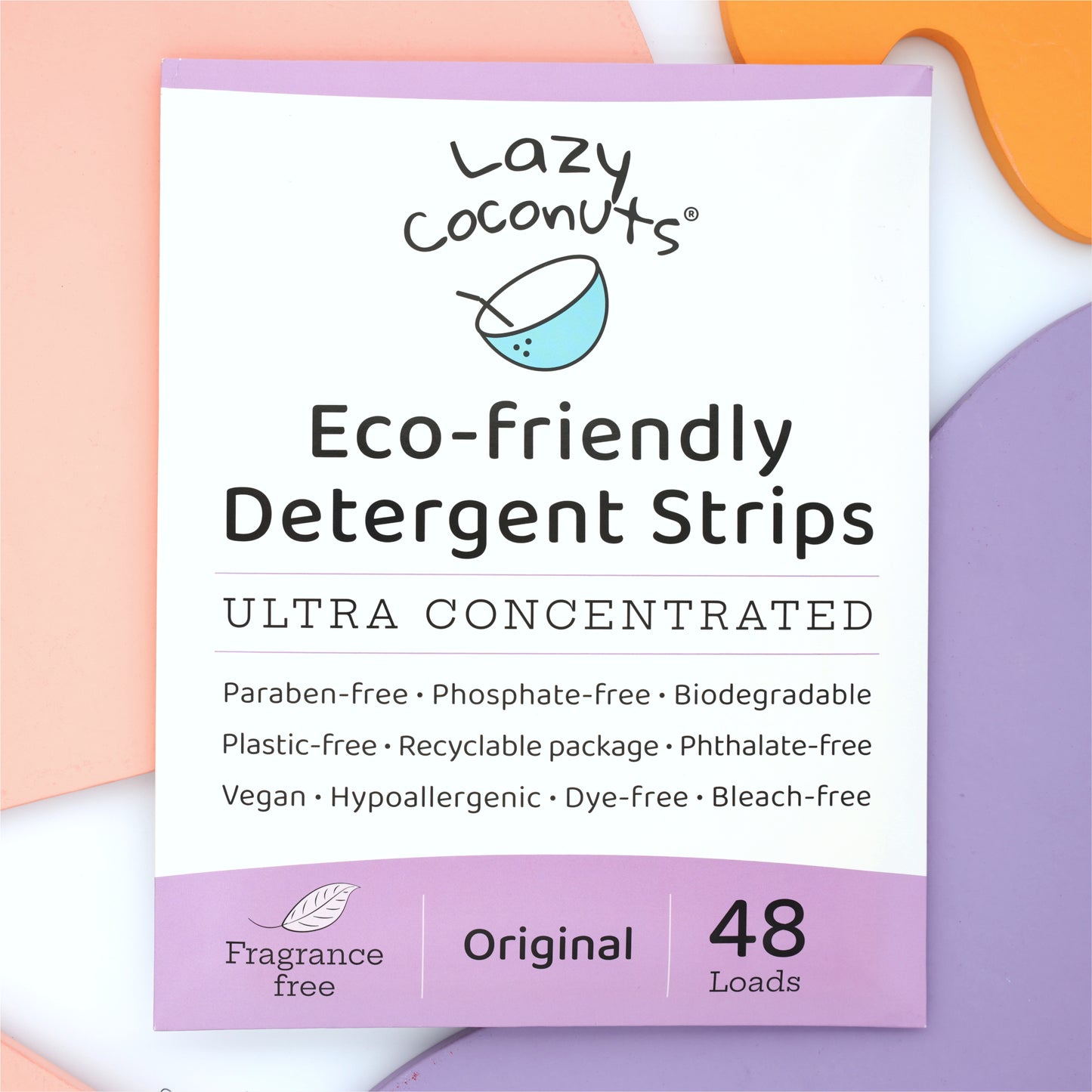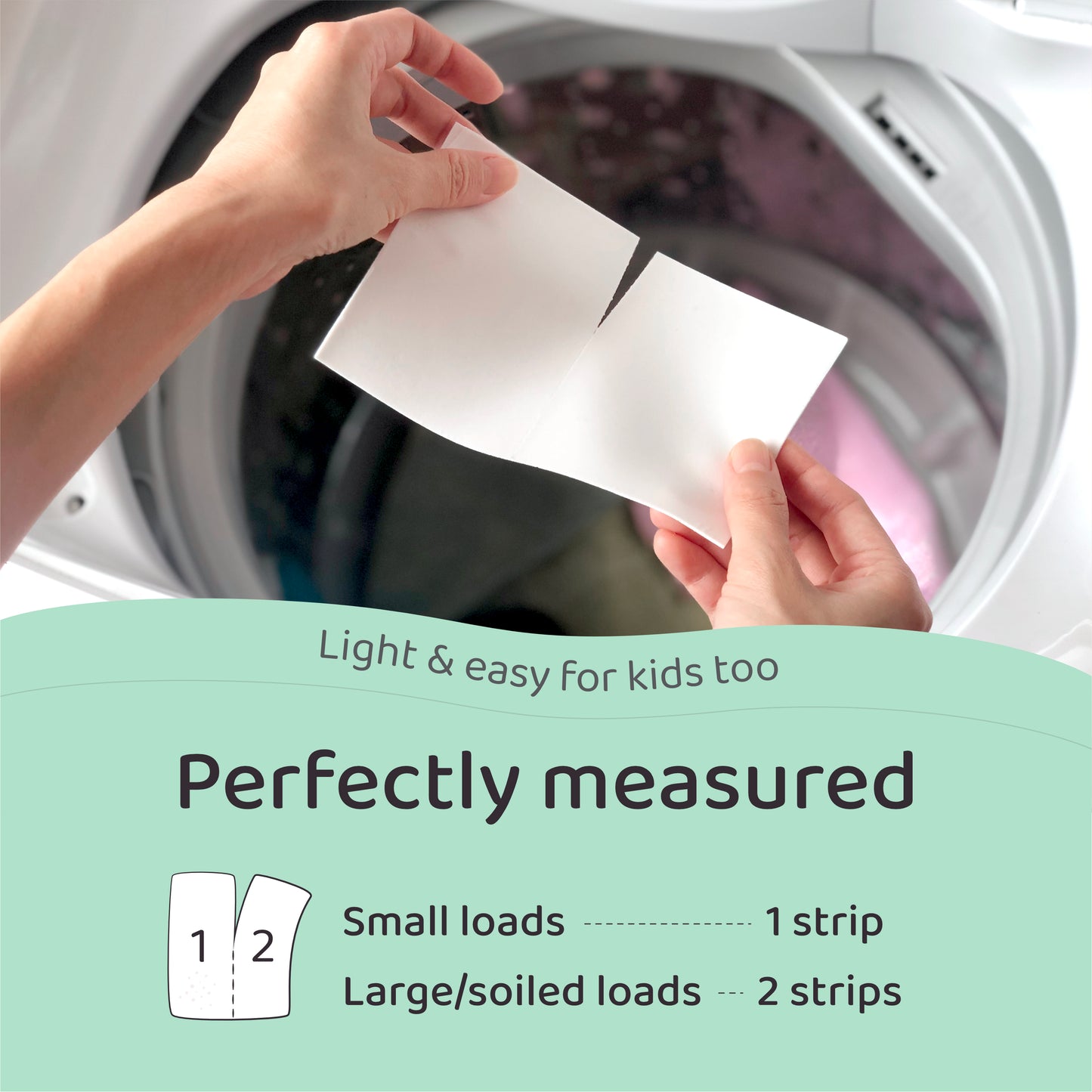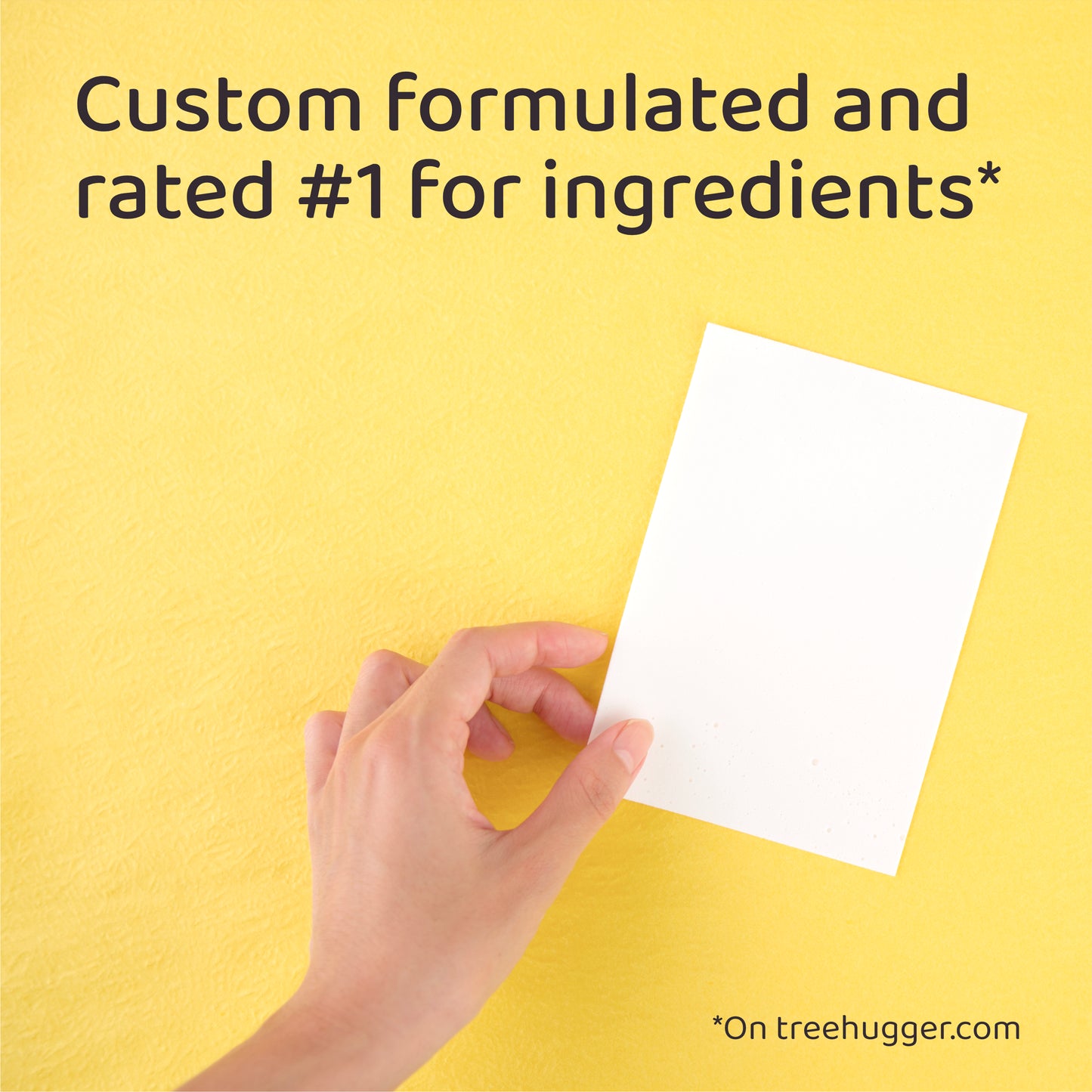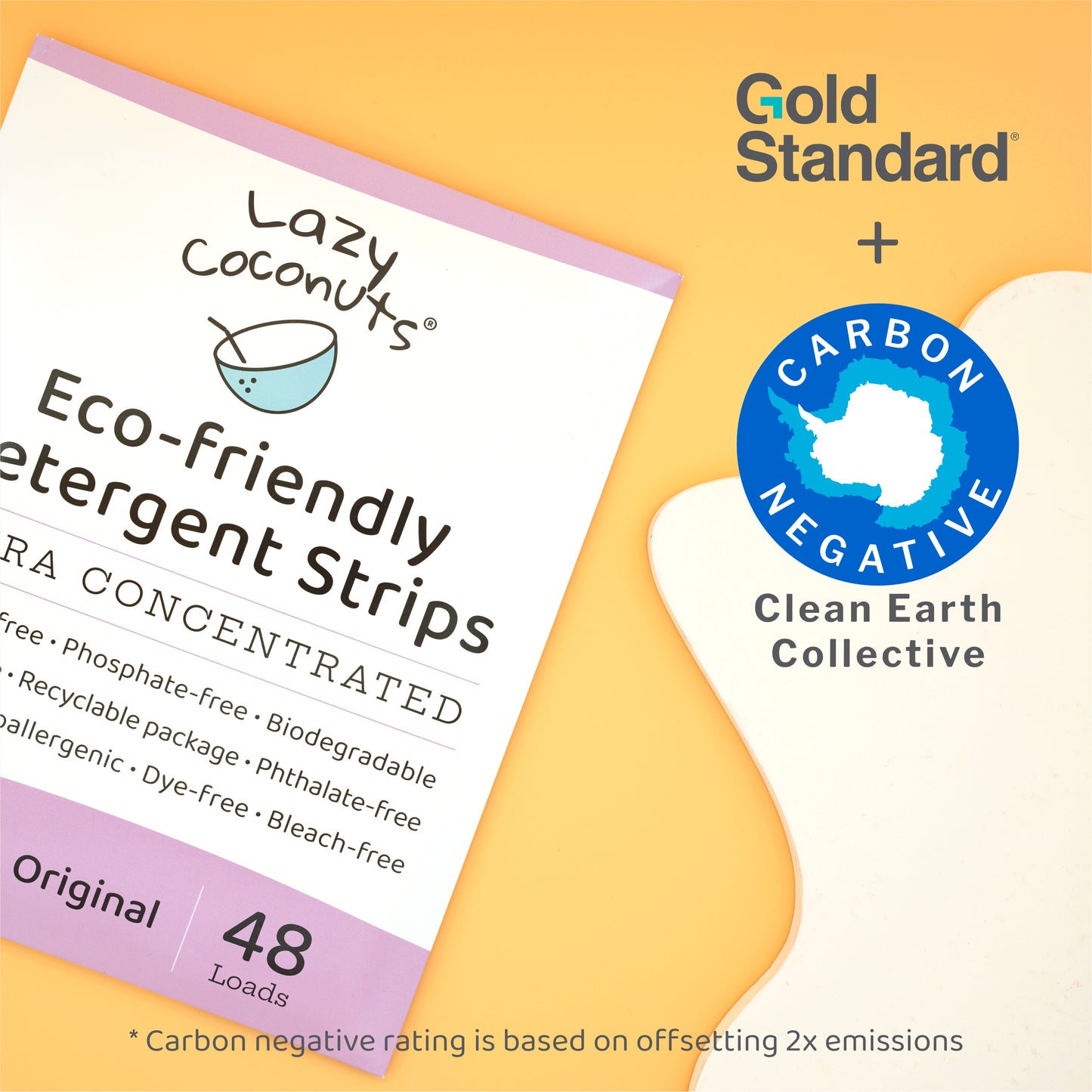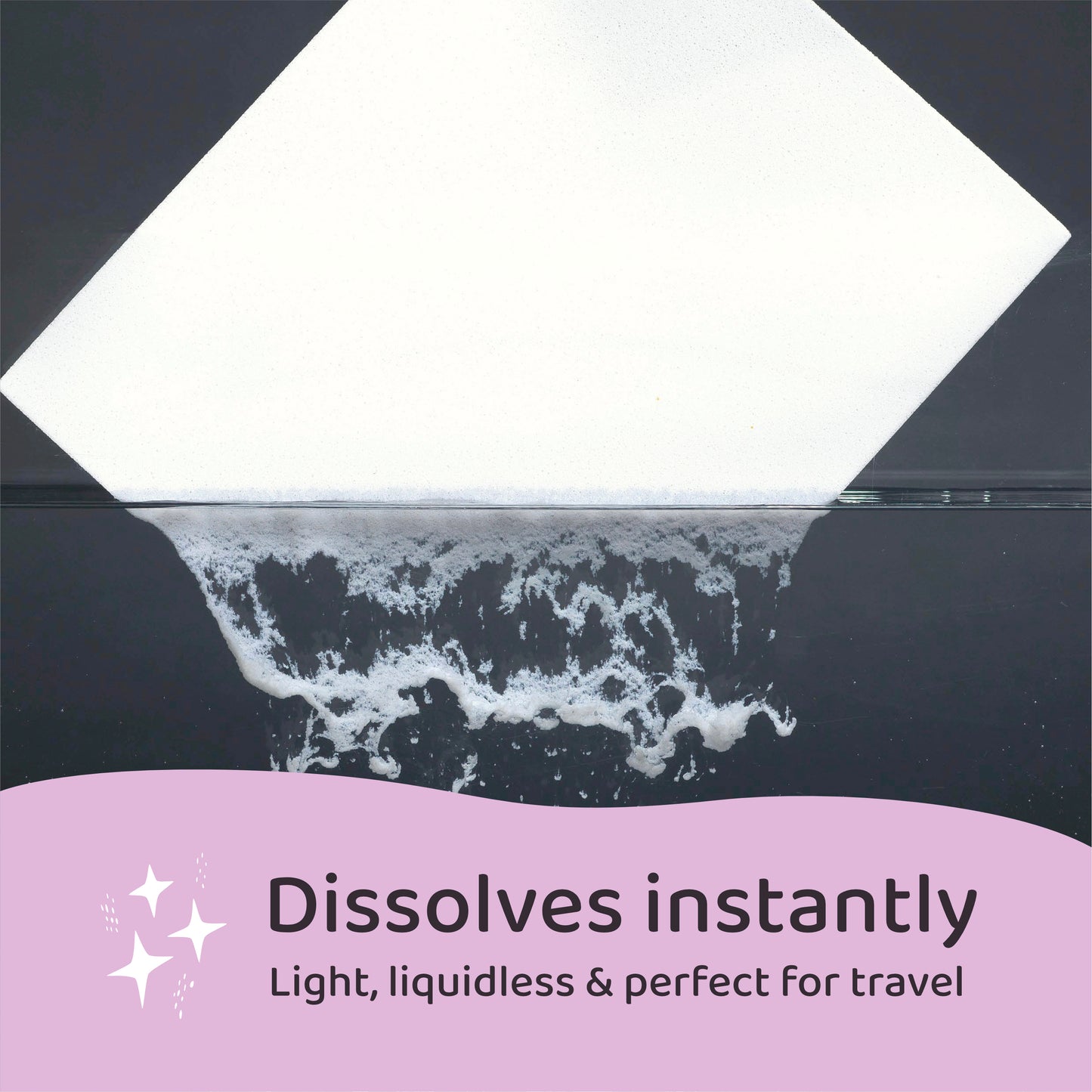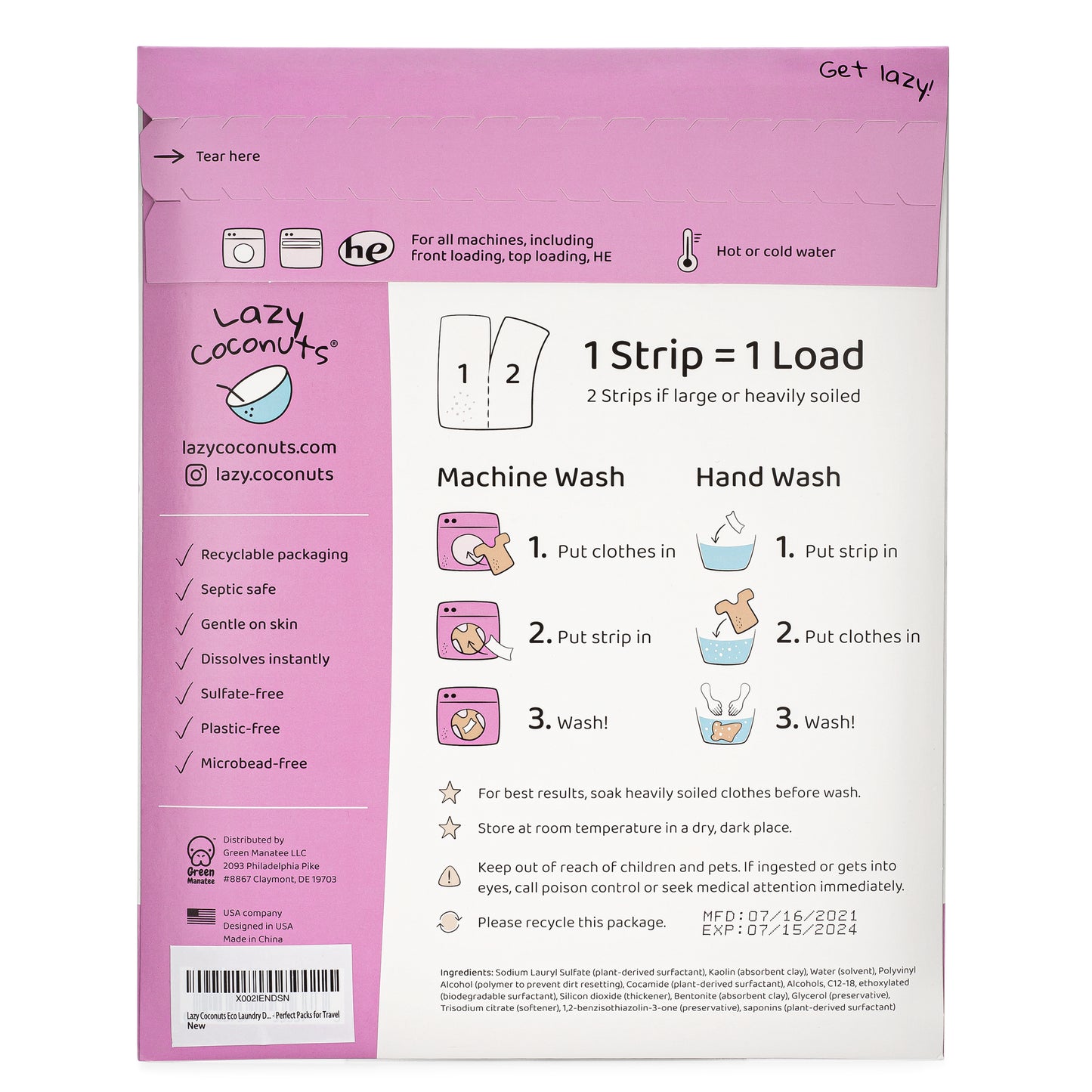
FAQ
-
Do your strips contain any soy or soy derived ingredients?
No, both our original and gentle detergent strips do not contain any soy or soy derived ingredients.
-
What are your surfactants derived from?
Cocoyl isethionate: coconut
Cocomidopropyl betaine: coconut
Cocamide: coconut
Alcohols, C12-18, ethoxylated: corn, cassava, wheat, rice
Saponins: soapberry -
The detergent strips smell like there is a fragrance, but it says fragrance-free
Our detergent strips contain absolutely no added synthetic fragrances, though you may find they have a subtle natural odor which comes from the cleaning ingredients themselves.
-
Why don't sheets fully dissolve or stick on drum or clothes?
If your detergent sheets didn’t fully dissolve, it means that there was not adequate water pressure or volume surrounding the sheet during the wash cycle. This can happen if they get stuck on folded clothing that prevent water from circulating around the sheet or other similar situations. There are many ways to prevent this from happening, including:
1. Place strips directly in front of water jets in your washing machine to ensure they can dissolve easily
2. Place detergent sheets in detergent wash compartment instead of directly into the drum (though we recommend placing in drum if you aren’t experiencing problems)
3. Pre-dissolving your detergent sheets in a small quantity of water, then adding that water directly into your washing machine drum -
What is a small or large load of laundry? Should I use 1 or 2 strips?
For normal sized machines, here’s a breakdown of how much detergent you need.
1/2 full drum, lightly soiled - 1/2 strip
1/2 full drum, soiled - 1 strip
3/4 full drum, lightly soiled - 1 strip
3/4 full drum, soiled - 1 1/2 strip
full drum, lightly soiled - 1 1/2 strip
full drum, soiled - 2 strips -
I have little or no suds, is it normal?
Yes, completely normal! Our strips are formulated to be low suds so you don’t have to worry about over sudsing in your washing machine, which is especially important for HE machines.
-
Are your sheets free of starch?
Yes! Our sheets contain NO starch—starch degenerates easily and is not conducive to long term storage which is why our sheets do not contain starch.
-
What is the size of each detergent sheet?
Each sheet is roughly 5.5 x 3.75in with a perforation running down the center. Once torn, each strip would be roughly 2.75 x 3.75in. Please note that there is some natural variance in the size and thickness of each sheet.
-
Safe to use to hand wash materials such as cashmere wool and Merino wool?
While it may be safe to wash these materials, none of our detergent strips were formulated specifically for the purpose of washing delicate materials like wool. As such, we do not recommend using our detergent strips to wash delicates.
-
How much detergent to use to hand wash in a hotel sink?
1 strip (1/2 sheet after tearing along perforation) is generally more than enough when handwashing in a sink. Simply dissolve the detergent thoroughly in water and wash your clothing. If you have very little clothing, you can tear a strip in half. If you are washing a lot of clothing, simply drain the water after dirty and dissolve another strip in fresh water.
-
Do your detergent strips contain coconut oil?
Our detergent strips do not contain raw coconut oil. However, they do contain cleaning agents which are derived from coconuts or coconut oil. For example, cocamide.
-
Can I store Lazy Coconuts detergent strips in an airtight glass or wood box instead of the cardboard sleeve?
Absolutely! You can store our strips anywhere dry that does not get hot. An airtight glass container will likely be better than a wood box because it will prevent the strips from absorbing extra humidity from the air.
-
Would the product work the same if the sheet was dissolved first and then the liquid was added to the detergent dispenser of a front loader?
Yes, absolutely!
-
Do we need to add oxygen bleach for effective wash?
You do not need to add oxygen bleach for effective wash. In some cases, it can affect detergent’s cleaning power because it changes the acidity of your water. However, many people find oxygen bleach useful to brighten whites and colors. It is an excellent non-toxic alternative to chlorine bleach, and may be especially useful for presoaking.
-
Do your detergent sheets contain soy, peas, beans, or any other legume?
No, our detergent sheets do not contain any legumes.
-
Does polyvinyl alcohol (PVA) contain microplastics?
Recent studies show that polyvinyl alcohol (PVA) does not dissolve intro microplastics—PVA’s high water solubility means that it dissolves into non-harmful monomers which then decompose into nutrients. There is some discussion about the conditions required in water treatment plants for this to happen, but the truth is that more research is needed in order to know conclusively. While we do not have immediate plans to release a strip without PVA, we are closely monitoring the discussion and will continue to work to make our formulation the best on the market.
References
https://www.degruyter.com/document/doi/10.1515/tsd-2020-2326/html
The high water solubility in itself implies that detergent capsule films are not within the microplastic scope.
https://faq-ans.com/en/Q%26A/page=492d5c8fdc5895f6dbfe4fd65062156c
Does Polyvinyl Alcohol contain microplastics ? PVA dissolves into a non-harmful monomer (i.e., NOT microplastics ). Scientists tell us that the monomers eventually decompose into reusable nutrients over time.
https://www.canr.msu.edu/news/trending-polyvinyl-alcohol
https://www.grove.co/blog/polyvinyl-alcohol#4iti8bqw78RnW5YXPZi8kU
https://www.forbes.com/sites/jeffkart/2021/08/08/study-says-up-to-75-of-plastics-from-detergent-pods-enter-the-environment-industry-says-they-safely-biodegrade/?sh=4039c48f796a
The objective was to estimate nationwide emissions of PVA from the domestic use of laundry and dish detergent pods. Researchers concluded that as much as 75% of PVA from detergent pods goes untreated in the United States, with [more than 8,000 tons](https://plasticoceans.org/detergent-pods-contributing-to-plastic-pollution/) per year entering the environment.
https://www.eurekalert.org/news-releases/923669
“According to our model, most of the PVA just passes through the treatment plant,” Kelkar said. “And then it depends. It might completely biodegrade if the environmental conditions are met. And if they’re not met, say in a cool area where the bacterial activity is relatively low, it’s unknown what happens to this large amount of polyvinyl alcohol.” -
Is polyvinyl alcohol (PVA) plastic?
While PVA is plastic-like, it differs from conventional plastics in that it can biodegrade fully into minerals when consumed by certain strains of bacteria. The best description of PVA would be that it is a water-soluble synthetic polymer. Recent studies show that PVA also does not dissolve intro microplastics. There is some discussion about the conditions required in water treatment plants for this to happen, but more research is needed to have a conclusive answer. We continue to monitor this discussion closely.
Reference: https://www.sciencedirect.com/topics/earth-and-planetary-sciences/polyvinyl-alcohol -
Will the strips store well in hot, humid climates such as tropical forests, or will they dissolve in the package?
As long as the strips don't come in direct contact with water, they will stay preserved in the package without dissolving, even in high humidity environments.
-
Do your detergent sheets need to be stored in a closed container?
No, our sheets don't need to be stored in a closed container, and can be stored in the original packaging after opening. But placing them inside of a sealed/closed container (e.g. glass container or zip lock bag) won't hurt, and can offer some extra protection in cases like direct exposure to excess moisture.
-
Do your strips work in cold water?
Yes! You can use our detergent strip in hot or cold water.
-
What is the pH of your detergent strips?
Our detergent strips have a pH that ranges from 7-9.5.
-
Are Lazy Coconuts detergent strips tested on animals?
Our detergent strips are vegan and are not tested on animals.
-
Do your detergent strips work in an HE washing machine?
Yes, our strips work in all washing machines, including HE machines.







